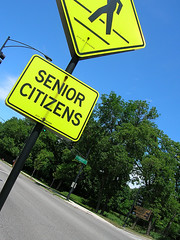It takes a village to age in place

Posted October 17, 2008 at 2:19PM
Late last year, I ran a blog post about how so many of our communities are not configured in a way that allows residents to remain there in their older years. I know that, in my mother's case, although her house was modest, it was at the end of a long driveway in a neighborhood without sidewalks.  When it became difficult and eventually unsafe for her to drive, she became more and more isolated. This is far from uncommon.
When it became difficult and eventually unsafe for her to drive, she became more and more isolated. This is far from uncommon.
In my previous post, I noted that older nondrivers are likely to make 15 percent fewer trips to the doctor, 59 percent fewer trips to stores or restaurants, and 65 percent fewer trips to social, family or religious gatherings. Yet the number of senior citizens in the US is expected to double by 2030.
One of the answers - and maybe the most important one - is to build "complete communities" that contain a variety of housing types and prices, including facilities for seniors, so that as one's needs change there are good options for remaining in the community. Another is to build neighborhoods that are safe, convenient, and interesting for all, including nondrivers and people with special needs.
Last Sunday's Washington Post contained a story by Fredrick Kunkle about how, increasingly, some communities are forming "village" associations to help seniors meet their needs while remaining as long as possible in their homes:
"But those folks [in Virginia's southern Fairfax County] are older now, and they're missing something -- neighbors to lend a hand, offer a ride to the grocery store or drop by to say hello. To remain in the homes they have long enjoyed, residents are creating a new kind of village.
"Following the lead of nationally known Beacon Hill Village in Boston, residents have formed an organization that would stitch their lives closer together and offer a variety of services that might allow them to hang on
to their lifestyle as they age. Known as Clifton-Fairfax Station Transition in Place Services, it is one of a half-dozen of such grass-roots organizations forming in the Washington region and across the country as America's baby boomers age together.
"For an annual fee, these organizations use a small professional staff and volunteers to arrange members' transportation to the doctor's office or the grocery store, to find in-home medical care or to compile a list of reliable contractors who do home repairs at a discount. Modeled on the idea of a hotel's concierge service or a village's face-to-face volunteerism, the organization is part of a broader strategy to promote "aging in place" as an alternative to retirement homes . . .
"'This is the urban equivalent of barn-raising,' said Palisades Village [in Washington, DC] President Andrew Mollison, whose organization will begin phasing in operations before the end of the year . . ."
It's a very good article that articulates both the challenges and opportunities facing seniors and their communities, including in rural and suburban areas where the challenges are the greatest. Go here for the full piece.